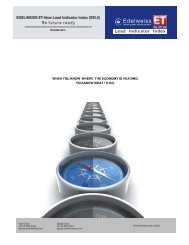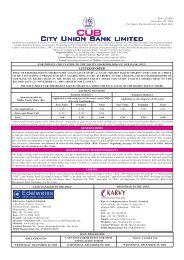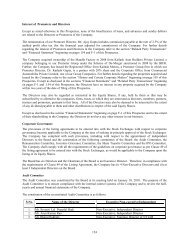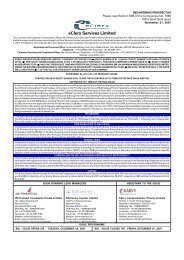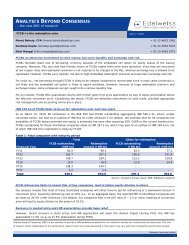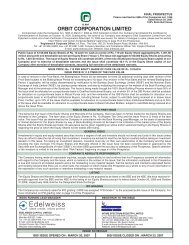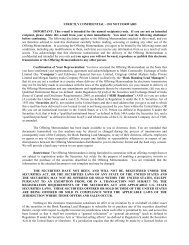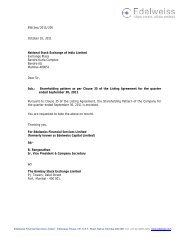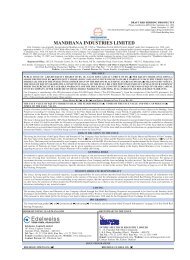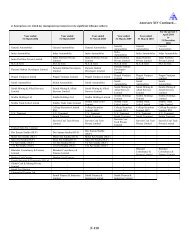GAYATRI PROJECTS LIMITEDIndian Clean Cash 2169.00 BPLR Pari passu charge by way of hypothecation of entireOverseas Credit presently current assets. Bank11.50% Pari passu charge on block of assets which are specificallycharged to any bank/ financial institutionCollateral Security1. Maheswari & Parameswari Theatre complex at Hyderabad in name of Gayatri Hotels & Theatres Pvt Ltd valued at Rs. 2102 lakhs2. House at 6-3-249/5/A, Road no 1, Banjara Hills belonging to Mr. T.Subbarami Reddy, valued at Rs. 1660 lakhs.3. House property at 8-2-331/12/A, Road No. 3, Banjara Hills, Hyderabad brelonging to Sh. T.V.Sandeep Kumar Reddy valued at Rs. 468lakhs.4. Ag Land & Building at Medchal village Ranga Reddy District S.No. 874.875, 880 & building no. 11-52 to 56 belonging to Mr. T.V.SandeepKumar Reddy valued at Rs. 524 lakhs.5. Commercial complex at 106/106/A (old) 1-7-1 (new) situated at SP road, Secundrabad belonging to Mr. T.Subbarami Reddy valued atRs. 3095 lakhs.6. Open land at Shanti Nagar, Fathekhan pet, Nellore district in the name of MR. G.Sivakumar Reddy valued at Rs. 117 lajhs7. Commercial property at 6-3-1090 TSR Towers, Rajbhawan Road, Hyderabad belonging to Deep Enterprises valued at Rs. 7851 lakhs.8. House property at Road no. 11, Banjara Hills, Hyderabadbelonging to Mrs. T.Saritha Reddy valued at Rs. 295 lakhs9. Guest house at TS 1011, Waltair Uplands Visakapatnam belonging to Gayatri Engineering Pvt. Ltd. valued at Rs. 246 lakhs10. 5 acres of land at S.No. 122/3 (patta No. 481) of Tunglam village, Sheela Nagar, Visakhapatnam standing in the name of M/s ShivaSankari Engineering Co valued at Rs. 605 lakhs.Guarantors1. Personal Guarantee of Smt. T Indira Reddy, Mr. T Subbarami Reddy, Sri J Brij Mohan Reddy Sri T V Sandeep Kumar Reddy, Sri G SivaKumar Reddy, Smt Sulochanamma.2. Guarantees of Gayatri Hotels & Theatres Pvt. Ltd., Deep Enterprises, Smt T.Sarita Reddy, Gayatri Eng Pvt. Ltd. and Shova ShankariEng CoUnit Trust Non-convertible 1500.00 12.00% Hypothecation of Construction equipments of book value ofOf India Debentures Rs. 3013 lakhs Joint and several Irrevocable guarantee of Sh T.V.Sandeep KumarReddy, Smt T. Indira Reddy, Sh. T. Subbarami Reddy.· Mortgage over immovable property bearing sub division No.5forming part of final Gat no. 249 of survey no. 120 villageDongergaon of taluka Mawal District Pune measuring 475 sq.yards.Previous Defaults / DelaysWe have issued 14% Secured Redeemable Non-Convertible Debentures of Rs. 100/- each of aggregate value of Rs. 1500lakhs on private placement basis to Unit Trust of India in May, 2001. We delayed payment of interest payment during 2001-02 and 2002-03 due to financial constraints. Consequently, UTI issued recall notice in January, 2003 and enforcement ofguarantee notice in February, 2004. UTI in the meantime also preferred an application for debt recovery before Debt RecoveryTribunal and claimed an amount of Rs. 1617.26 lakhs. We cleared all our interest dues to UTI in September, 2004 and arenow regularly paying interest instalments. Further, we have also paid on due date the instalment of Rs. 500 lakhs, which wasdue on July 03, 2006. The balance one instalment of Rs.500 lakhs is due on July 3, 2007. The matter is still to be withdrawnfrom the DRT and is adjourned since 2000.64
REGULATIONS AND POLICIESThere are no specific regulations in India governing the construction industry. Sets forth below are certain significant legislationsand regulations that generally govern this industry in India:GeneralThe Company is engaged in execution of major Civil Works including Concrete / Masonry Dams, Earth Filling Dams, NationalHighways, Bridges, Canals, Aqueducts, Ports etc.Contracts are executed in pursuance of tenders/quotations issued by the Government, Government agencies, Governmentcompanies, private companies, public companies and multinational companies or by orders placed by them. For the purposeof executing the work undertaken by the Company, we may be required to obtain licenses and approvals depending uponthe prevailing laws and regulations applicable in the relevant state. For details of such approvals please see “Governmentand Other Approvals” on page 163 of this Prospectus.Foreign OwnershipUnder the Industrial Policy and FEMA, foreign direct investment up to 100% is permitted in construction and related engineeringservices. Further, the Industrial Policy now also permits foreign direct investment under the automatic route in <strong>projects</strong> forconstruction and maintenance of roads, highways, vehicular bridges, toll roads, vehicular bridges and ports and harbors.Subject to certain conditions and guidelines, the Industrial Policy and FEMA further permit up to 100% foreign direct investmentin townships, housing, built-up infrastructure and construction development <strong>projects</strong> which include, but are not restricted to,housing, commercial, premises, hotels, resorts, hospitals, educational institutions, recreational facilities and city and regionallevel infrastructure. In respect of the companies in infrastructure/ service sector, where there is a prescribed cap for foreigninvestment, only the direct investment is considered for the prescribed cap and foreign investment in an investing companymay not be set off against this cap provided the foreign direct investment in such investing company does not exceed 49%and the management of the investing company is with the Indian owners.The RBI by its A.P. (DIR Series) circular No. 16 dated October 4, 2004 granted general permission for the transfer of sharesof an Indian company by Non-Residents to residents, subject to the terms and conditions, including pricing guidelines, specifiedin such circular.Investment by Foreign Institutional InvestorsForeign Institutional Investors (“FIIs”) including institutions such as pension funds, investment trusts, asset managementcompanies, nominee companies and incorporated, institutional portfolio managers can invest in all the securities traded onthe primary and secondary markets in India. FIIs are required to obtain an initial registration from the SEBI and a generalpermission from the RBI to engage in transactions regulated under FEMA. FIIs must also comply with the provisions of theSEBI (Foreign Institutional Investors) Regulations, 1995, as amended from time to time. The initial registration and the RBI’sgeneral permission together enable the registered FII to buy (subject to the ownership restrictions discussed below) and sellfreely securities issued by Indian companies, to realise capital gains or investments made through the initial amount investedin India, to subscribe or renounce rights issues for shares, to appoint a domestic custodian for custody of investments heldand to repatriate the capital, capital gains, dividends, income received by way of interest and any compensation receivedtowards sale or renunciation of rights issues of shares.Ownership restrictions of FIIsUnder the portfolio investment scheme, the overall issue of equity shares to FIIs on a repatriation basis should not exceed24% of post-issue paid-up capital of the company. However, the limit of 24% can be raised up to the permitted sectoral capfor that company after approval of the board of directors and shareholders of the company. The Issue of equity shares to asingle FII should not exceed 10% of the post issue paid-up capital of the Company. In respect of an FII investing in equityshares of a company on behalf of its sub-accounts, the investment on behalf of each sub-account shall not exceed 10% ofthe total issued capital of that company.Environmental and Labour RegulationsDepending upon the nature of the <strong>projects</strong> undertaken by the Company, applicable environmental and Labor Laws andregulations include the following:65
- Page 2 and 3:
TABLE OF CONTENTSPAGE NO.SECTION I:
- Page 4 and 5:
GAYATRI PROJECTS LIMITEDTermsBidder
- Page 6 and 7:
GAYATRI PROJECTS LIMITEDTermsDescri
- Page 8 and 9:
GAYATRI PROJECTS LIMITEDTermsBOTCAR
- Page 10:
GAYATRI PROJECTS LIMITEDTermsNSDLNS
- Page 13:
RISK FACTORSAn investment in equity
- Page 16 and 17:
GAYATRI PROJECTS LIMITED8. Our Prom
- Page 18 and 19:
GAYATRI PROJECTS LIMITEDMain Object
- Page 20 and 21:
GAYATRI PROJECTS LIMITEDWe have exe
- Page 22 and 23:
GAYATRI PROJECTS LIMITEDthe occurre
- Page 24 and 25:
GAYATRI PROJECTS LIMITED34. Some of
- Page 26 and 27:
GAYATRI PROJECTS LIMITEDEXTERNAL RI
- Page 28 and 29:
GAYATRI PROJECTS LIMITEDfor a secti
- Page 30 and 31:
GAYATRI PROJECTS LIMITEDSteel Ltd.,
- Page 32 and 33:
GAYATRI PROJECTS LIMITEDSUMMARY OF
- Page 34 and 35:
GAYATRI PROJECTS LIMITEDTHE OFFERPA
- Page 36 and 37:
GAYATRI PROJECTS LIMITEDFor further
- Page 38 and 39:
GAYATRI PROJECTS LIMITEDSYNDICATE M
- Page 40 and 41:
GAYATRI PROJECTS LIMITEDThe Hongkon
- Page 42 and 43: GAYATRI PROJECTS LIMITEDThe price d
- Page 44 and 45: GAYATRI PROJECTS LIMITEDCAPITAL STR
- Page 46 and 47: GAYATRI PROJECTS LIMITEDDate of No.
- Page 48 and 49: GAYATRI PROJECTS LIMITED4. There ha
- Page 50 and 51: GAYATRI PROJECTS LIMITED22. Not mor
- Page 52 and 53: GAYATRI PROJECTS LIMITEDLimited wil
- Page 54 and 55: GAYATRI PROJECTS LIMITEDOther Impor
- Page 56 and 57: GAYATRI PROJECTS LIMITEDDividendsIf
- Page 58 and 59: GAYATRI PROJECTS LIMITEDPursuant to
- Page 60 and 61: GAYATRI PROJECTS LIMITEDNomination
- Page 62 and 63: GAYATRI PROJECTS LIMITED3. Return o
- Page 64 and 65: GAYATRI PROJECTS LIMITEDTAX BENEFIT
- Page 66 and 67: GAYATRI PROJECTS LIMITEDcontrol reg
- Page 68 and 69: GAYATRI PROJECTS LIMITEDINDUSTRY OV
- Page 70 and 71: GAYATRI PROJECTS LIMITEDFour-laning
- Page 73 and 74: wagon drills, jack hammers, air com
- Page 75 and 76: Top 5 major assignments completed u
- Page 77 and 78: The details of top 5 road sector pr
- Page 79 and 80: Tendering ActivityA brief flow char
- Page 81 and 82: We enter into contracts primarily t
- Page 83 and 84: S. Favouring BG No. BG Date Expiry
- Page 85 and 86: Memorandum of UnderstandingIn addit
- Page 87 and 88: project to pool in their own resour
- Page 89 and 90: Following are the number of employe
- Page 91: Syndicate OSL (ST) 1500.00 PLR + 1%
- Page 95 and 96: OUR HISTORY AND CERTAIN CORPORATE M
- Page 97 and 98: Date of ChangeJuly 10, 1996Particul
- Page 99 and 100: Sl. Name, Designation, Father’s N
- Page 101 and 102: Compensation paid to Managing Direc
- Page 103 and 104: Management Organisation ChartKey Ma
- Page 105 and 106: Mr. Brahmaiah Lingam, D G M (Techni
- Page 107 and 108: INFORMATION OF OUR PROMOTER GROUP C
- Page 109 and 110: Banksi) Term Lenders (PNB and Andha
- Page 111 and 112: Name of Institution / Bank Principa
- Page 113 and 114: Shareholding Pattern as on August 3
- Page 115 and 116: Board of Directors1. Mr. T V Sandee
- Page 117 and 118: 9. M/s Gayatri Digisoft Technologie
- Page 119 and 120: Brief Financials(Rs. in Lakhs)Parti
- Page 121 and 122: Board of Directors1. Mrs. T. Indira
- Page 123 and 124: Brief Financials(Rs. in Lakhs)Parti
- Page 125 and 126: Indira Publications Private Limited
- Page 127 and 128: However the firm was corporatized,
- Page 129 and 130: Board of Directors1. Ms. T Indira R
- Page 131 and 132: Shareholding Pattern as on August 3
- Page 133 and 134: Brief Financials(Rs. in Lakhs)Parti
- Page 135 and 136: Brief Financials(Rs. In Lakhs)Parti
- Page 137 and 138: Brief Financials(Rs. in Lakhs)Parti
- Page 139 and 140: Brief Financials(Rs. in Lakhs)Parti
- Page 141 and 142: Brief Financials(Rs. In Lakhs)Parti
- Page 143 and 144:
Benefit of the Joint VentureTo obta
- Page 145 and 146:
Related Party Transactions as per A
- Page 147 and 148:
DIVIDEND POLICYThe declaration and
- Page 149 and 150:
SCHEDULE-ISTATEMENT OF RESTATED ASS
- Page 151 and 152:
ANNEXURE II-AConsolidated Notes to
- Page 153 and 154:
8. Related Party Transactions as pe
- Page 155 and 156:
10. Accounting for taxes on IncomeA
- Page 157 and 158:
18.3.1. Expenditure in foreign curr
- Page 159 and 160:
SCHEDULE-VCAPITALIZATION STATEMENT(
- Page 161 and 162:
SCHEDULE-IXDETAILS OF LOANS AND ADV
- Page 163 and 164:
Details of related parties:Associat
- Page 165 and 166:
MANAGEMENT’S DISCUSSION AND ANALY
- Page 167 and 168:
Our Results of OperationsAs a resul
- Page 169 and 170:
ExpenditureOur expenditure consists
- Page 171 and 172:
DepreciationDepreciation increased
- Page 173 and 174:
Status of any publicly announced Ne
- Page 175 and 176:
lakhs (for value of work done upto
- Page 177 and 178:
11. Gayatri Projects Limited vs. St
- Page 179 and 180:
V. Ramulamma vs. Gayatri Projects L
- Page 181 and 182:
Govt. of Andhra Pradesh vs. Gayatri
- Page 183 and 184:
for Loss of Profit suffered by the
- Page 185 and 186:
whether the claimant is a small sca
- Page 187 and 188:
Govt. of India and South Indian Mil
- Page 189 and 190:
and Other Claims. The total amount
- Page 191 and 192:
GOVERNMENT AND OTHER APPROVALSIn vi
- Page 193 and 194:
S. No. Name of State Type of regist
- Page 195 and 196:
(Rs. in lakhs)Financial Year 2001-0
- Page 197 and 198:
Regional Rural Banks, Co-operative
- Page 199 and 200:
Activity (Rs. In Lakhs) % of Total
- Page 201 and 202:
ii. Gayatri Sugars Limited (erstwhi
- Page 203 and 204:
OFFER STRUCTUREPublic Issue of 29,0
- Page 205 and 206:
OFFER PROCEDUREBook Building Proced
- Page 207 and 208:
The above information is given for
- Page 209 and 210:
6. Each Bid cum Application Form wi
- Page 211 and 212:
Each category of Bidders i.e. QIBs,
- Page 213 and 214:
Price Discovery and Allocation1. Af
- Page 215 and 216:
of PAN along with the application f
- Page 217 and 218:
By signing the Bid-cum-Application
- Page 219 and 220:
No separate receipts shall be issue
- Page 221 and 222:
All Bidders can seek allotment only
- Page 223 and 224:
3. For QIB BiddersBids received fro
- Page 225 and 226:
2. Direct Credit - Applicants havin
- Page 227 and 228:
As per the current regulations, OCB
- Page 229 and 230:
Such offer shall be made by a notic
- Page 231 and 232:
for all his shares of each class wi
- Page 233 and 234:
Directors, and the forfeiture shall
- Page 235 and 236:
Renewal of share warrantThe board m
- Page 237 and 238:
ALTERATION OF CAPITALIncrease of ca
- Page 239 and 240:
estrictions as the Company in Gener
- Page 241 and 242:
Chairman of general meetingWhen if
- Page 243 and 244:
P r o x yTime for deposit of instru
- Page 245 and 246:
Additional DirectorRemoval of Direc
- Page 247 and 248:
draft thereof in writing is circula
- Page 249 and 250:
Reserve and depreciation fundsDivid
- Page 251 and 252:
Service by postMember resident abro
- Page 253 and 254:
INDEMNITYEvery Director, Auditor, O
- Page 255 and 256:
11. Consent letters from Promoters,
- Page 257 and 258:
THIS PAGE HAS BEEN INTENTIONALLY LE




